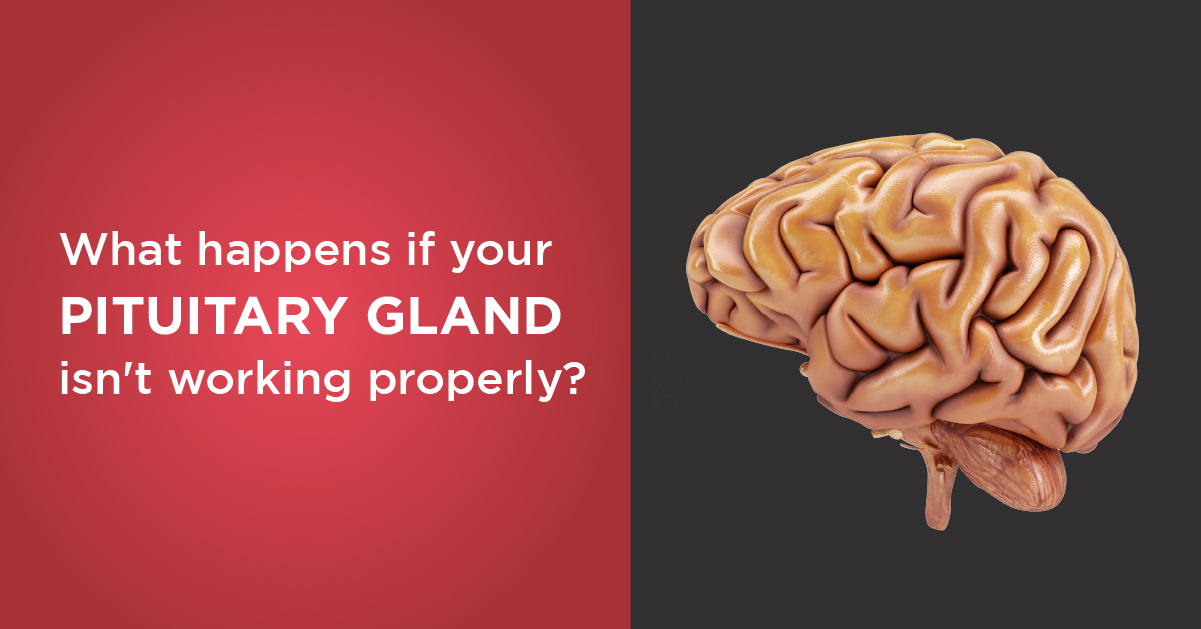Is your pituitary gland not working properly?

Your pituitary gland is an important pea-sized organ. It is often referred to as the “master gland” because it not only secretes its own hormones, it tells other glands to produce hormones. This master gland controls the thyroid gland, adrenal gland, ovaries, and testicles.
What does the pituitary gland do?
Glands are organs that secrete hormones — the “chemical messengers” of the body — that travel through your bloodstream to different cells, telling them what to do. The major hormones produced by the pituitary gland are:
ACTH: Adrenocorticotrophic hormone. Triggers cortisol production and the chemical reaction that makes your body produce adrenaline and noradrenaline.
FSH: Follicle-stimulating hormone. Promotes sperm production and stimulates the ovaries to produce estrogen.
LH: Luteinizing hormone. Responsible for fertility, puberty and menstruation in women, and testosterone production in men.
GH: Growth hormone. It helps maintain healthy muscles and bones and manage fat distribution.
PRL: Prolactin. Causes breast milk to be produced after childbirth. It also affects hormones that control the ovaries and testes, which can affect menstrual periods, sexual functions, and fertility.
TSH: Thyroid-stimulating hormone. Stimulates the thyroid gland, which regulates metabolism, energy, and the nervous system.
Oxytocin: Helps labour to progress, causes breast milk to flow, affects labour, breastfeeding, behaviour and social interaction, and the bonding between a mother and child.
ADH: Anti-diuretic hormone, or vasopressin. Controls your blood pressure and conserves the fluids in your body.
Hormones are not released from the pituitary gland in a steady stream. They come in bursts, every one to three hours, and alternate between periods of activity and periods of inactivity.
What happens when the pituitary gland doesn’t work properly?
Your body depends on the hormones it produces and releases. If the pituitary gland is not producing enough hormones, your symptoms could include:
- Infertility or sexual dysfunction
- Problems with bone growth
- Headaches
- Menstrual problems
- Sleep disorders
- Hair loss or excessive hair growth
- Swings in your weight, up or down
- Increased Urine Output
- Delayed Puberty
When your pituitary gland fails to operate as it should, you may or may not notice any symptoms right away. Everyone reacts differently to imbalances in their hormone levels, but both men and women both can have problems that will only worsen over time if you don’t seek help.
How is an underactive pituitary gland diagnosed?
You should see an endocrinologist, a specialist in the pituitary gland. They will use a blood test to check your levels of the hormones the pituitary gland produces. They may also check for hormones your pituitary gland stimulates other glands to release. Once it is determined which hormone levels are low, they must check the parts of your body (target organs) those hormones affect. Sometimes, the problem isn’t with your pituitary gland, but rather with the target organs. An endocrinologist may also perform imaging tests, such as a CT scan or MRI scan on your brain. These tests can help them figure out if a tumour on your pituitary gland is affecting its function.
How is an underactive pituitary gland treated?
There is no single course of treatment because this condition may affect a number of hormones. In general, the goal of treatment is to bring all your hormone levels back to normal.
Pituitary problems are best managed by an endocrinologist. Regency Hospital has some of the top endocrinologists in the country. Visit today for a consultation.
Request a call back


 Call-an-Ambulance
Call-an-Ambulance



